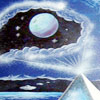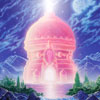The New Atlanteans
 by Rosemary Ellen Guiley
by Rosemary Ellen Guiley
Any persons who have sought past-life regressions during the 1970s and 1980s have turned up lives in Atlantis. Edgar Cayce identified early Atlantis and late Atlantis as part of two soul groups. He further said that a great influx of Atlanteans reincarnated between the years of 1909-1913. Such individuals, especially those born in 1910-1911, promised to wield unusual powers for influencing world affairs for either good or bad. The Atlanteans supposedly turned their great powers of their advance society to serve evil and thus brought about their own destruction.
Most of the individuals seeking regressions in the 1970s and 1980s were much younger, however, having been born predominantly in the 1940s through 1960s. This suggests a new cycle of Atlantean incarnations. Why are so many seeing past lives in Atlantis?
There are several reasons why. First, there has been a new surge of interest in ancient cultures and the legendary Atlantis during the New Age. Second, and more significant, is that many Atlantean recalls deal with healing. The Atlanteans are believed to have possessed unusual and remarkably effective healing techniques employing crystals, vibration, sound and music, color and energy transfer. The New Age has witnessed great renewed interest in alternative and holistic healing techniques using the very same tools. Accessing these Atlantean healing lives has in many cases awakened individuals to their own potential healing abilities. Third, Atlantis is a mirror of our own culture: a high-tech, materialistic and increasingly corrupt and violent society headed down the path of self-destruction. It is possible that Atlanteans have reincarnated in the present in order to help prevent the same fate that befell their land.
But many people do not believe in Atlantis and say the legend is pure fantasy, highly romanticized by film and fiction. What do we really know about Atlantis?
The Atlantean Legend
According to legend, Atlantis was a island continent with a highly advanced civilization interested in science and technology; their advances were made possible with help from space beings. Their greed, materialism and corruption eventually led to their downfall, and to the destruction of their entire continent by massive tidal waves, floods and earthquakes which sank the land beneath the sea. Some survived, and dispersed to other lands around the world, taking their culture and knowledge with them.
No one has ever found any proof that Atlantis existed, yet the legend has remained a powerful one over the centuries. More than 45 locations around the world on both sides of the Atlantic have been suggested as the site of the great continent.
Plato was the first person known to record the legend of Atlantis in 350 B.C.E. in his Timaeus and Critias of the Dialogues. According to Plato, Solon heard the story of Atlantis from an Egyptian priest. Solon told it to Critias, an old Athenian man, who told it to Socrates. The story, as told in Timaeus from the viewpoint of the Egyptian priest, takes place in 9600 B.C.E.:
Many great and wonderful deeds are recorded of your State [Athens] in our [Egypt’s] histories; but one of them exceeds all the rest in greatness and valor; for these histories tell of a mighty power which was aggressing wantonly against the whole of Europe and Asia, and to which your city put an end. The power came forth out of the Atlantic Ocean, for in those days the Atlantic was navigable; and there was an island situated in front of the straits which you call the Columns [Pillars] of Heracles: the island was larger than Libya and Asia put together, and was the way to other islands, and from the islands you might pass through the whole of the opposite continent which surrounded the true ocean; for this sea which is within the Straits of Heracles is only a harbor, having a narrow entrance, but that other is a real sea, and the surrounding land may be most truly called a continent. Now, in the island of Atlantis there was a great and wonderful empire, which had rule over the whole island and several others, as well as over parts of the continent: and, besides these, they subjected the parts of Libya within the Columns of Heracles as far as Egypt, and of Europe as far as Tyrhhenia.
The vast power thus gathered into one, endeavored to subdue at one blow our country and yours, and the whole of the land which was within the straits; and then, Solon, your country shone forth, in the excellence of her virtue and strength, among all mankind; for she was the first in courage and military skill, and was the leader of the Hellenes. And when the rest fell off from her, being compelled to stand alone, after having undergone the extremity of danger, she defeated and triumphed over the invaders, and preserved from slavery those who were not yet subjected, and freely liberated all the others who dealt within the limits of Heracles. But afterward there occurred violent earthquakes and floods, and in a single day and night of rain all your warlike men in a body sank into the earth, and the island of Atlantis in like manner disappeared, and was sunk beneath the sea. And that is the reason why the sea in those parts is impassable and impenetrable, because there was such a quantity of shallow mud in the water; and this was caused by the subsidence of the island.
Plato’s own student, Aristotle, didn’t believe the story of Atlantis and tried to debunk it as fiction. So did Pliny and Strabo several centuries later. The story survived, however, and in the Middle Ages, Atlantis was believed to have existed.
Some modern scholars agree with Aristotle and other ancient critics, that Atlantis was entirely a figment of Plato’s imagination. Nonetheless, the story bears striking similarities to legends in other cultures, including a legend from the Middle Kingdom of Egypt (c. 2000-1786 B.C.E.) and one in the Mahabharata of India (composed c. 300 B.C.E.). In addition, legends of the Indians of the Americas speak of space gods and races of highly evolved beings. Finally, the flood of Atlantis perhaps is related to the legends of a Great Flood which exist in cultures all over the world, with the exception of most of Africa and much of Asia.
In the late nineteenth century, “Atlantology,” the study of Atlantis lore, flowered with the publication of Atlantis: The Antediluvian World, by Ignatius Donnelly, an American Congressman. Donnelly said the existence of Atlantis could explain unusual similarities between widely separated cultures, such as the ancient Egyptians and the Indians of Central and South America. From his research, Donnelly concluded that:
— Atlanteans comprised at least two races, a small and dark-brown, reddish race similar to Egyptians, Berbers and Central Americans, and a large, white race similar to the Greeks, Goths, Celts and Scandinavians. There were many battles for supremacy.
— Atlanteans believed in reincarnation and embalmed their dead.
— There was an established order of priests who oversaw a simple religion.
— The continent itself had 1,500-foot high volcanic mountains, the tops of which were perpetually covered with snow; elevated table-lands where the royalty lived; a lower “great plain”; four rivers flowing from a central point to the four points of the compass; tropical and temperate zones; and fertile soil.
Theosophists, led by Helena P. Blavatsky, also disseminated views about the long-lost land in the late nineteenth century and early twentieth century. Blavatsky believed the continent perished out of natural old age, not the corruption of its inhabitants. She said it was formed by parts of Lemuria, which had been destroyed before it. The Atlanteans, who were descended from Lemurians, were giants twenty-seven feet in height who possessed great psychic powers, she said. They formed the Fourth Root Race of all humans. The priests of the Druids were the descendants of the last Atlanteans.
A different picture was provided by one of Blavatsky’s followers, Rudolph Steiner, who said he accessed the Akashic Records to learn about Atlantis. They were weak in logic, he said, but could control life forces and extract energy from plants. Their vehicles hovered a few feet off the ground. They did not possess telepathy, but communicated verbally.
Author Ruth Montgomery, receiving her information from spirit guides through automatic writing, said Atlanteans used a Great Crystal for power, and destroyed themselves by misusing the Crystal.
Yet another theory suggests that powerful ley lines converged at Atlantis, which provided its great energy source. Ley lines are lines of natural earth energy said to crisscross the world; where they intersect, they create powerful force fields. Many sacred sites are believed to be constructed at ley line junctions. Scientists contest the existence of ley lines, but dowsers say they may be detected and mapped.
Taylor Caldwell’s Atlantis. In 1913, at the age of twelve, Janet Taylor Caldwell, who later became famous as novelist Taylor Caldwell, wrote a novel about Atlantis. It flowed seemingly from memory, profound in maturity and sophistication for an adolescent. Later in adulthood, Caldwell said she seemed to “know” about Atlantis from infancy, and was “haunted” for years about it before she sat down to write it at the tender age of twelve.
The manuscript remained unpublished for about sixty years; by then, Caldwell had undergone hypnotic regression and had discovered Atlantis among her past lives. Caldwell’s Atlantis was a high-tech land of urban overcrowding, rising pollution, power shortages, loss of faith in religion among the masses, social and political upheaval, and a haven for immigrants from more oppressed lands. It was ruled by a monarch, who was among the small elite privileged to prolong life, to about 200 years, by exposure to rejuvenating chambers. They wore crystals to rejuvenate their energy. The continent was divided into twelve provinces, each of which had a certain amount of state autonomy. There were snow-capped volcanoes, great agricultural plains, and a shimmering sea mined for its minerals. The capital city of Lamora was filled with great pillars, domes and walls of gleaming stone.
In the novel, Salustra, the empress of Atlantis, faces the aggression of the neighboring nation, Althrustri. She falls in love with Althrustri’s emperor, Signar. Both lands are destroyed by earthquakes and tidal waves, save for a handful of inhabitants and the two leaders, who manage to escape to a new land.
After the novel was published in 1975 as The Romance of Atlantis (with co-author Jess Stearn), Caldwell experienced three vivid, exceptionally intense “big” dreams about Atlantis, in which she was Salustra. The dreams left her weeping for Atlantis and yearning for Signar, who she knew in her present life, but whose identity she never disclosed.
Atlantis according to Cayce. Of the 1,600 persons who received life readings by Edgar Cayce, 700 were told they had one or more lives in Atlantis, or “Poseidia,” as he also called it. The figure possibly could be higher, as Cayce may not have mentioned Atlantis in a life reading if it were not relevant to issues at hand. Life readings were given to Cayce’s family and friends, and concerned previous incarnations that were influencing the present life. The readings were overviews of characteristics, problems and assets; they are distinguished from the more than 25,000 “physical readings” Cayce gave to others.
Cayce said Atlantis was one of the first places on earth where man appeared in material form, as long as 10.5 million years ago. Humans took form and “hardened” by gratifying their material desires. The “red race” developed Atlantis rapidly, especially in science and technology, and particularly in transportation.
The Atlanteans, Cayce said, learned how to amplify sun rays with crystals to generate energy for light, heat, transportation and communication. They wielded “death rays,” which perhaps were lasers, and enslaved others. Musicians in temples produced “sounds of all nature” on instruments. The continent suffered three cataclysms, the third of which destroyed it all. The readings give no date for the first cataclysm; the second was said to have occurred around 28,000 B.C.E. After the first two disasters, many Atlanteans left the continent and migrated to other lands. Others remained behind to rebuild, though a great deal of dissent and discord spread throughout the land. The final destruction apparently is the one cited by Plato, occurring around 9600 B.C.E. Of Cayce’s Atlantean readings, most dealt with the continent’s final phase, when the civilization was in decline and suffering great turmoil. The people faced a choice between following God or indulging themselves; too many chose the latter and the culture became spiritually dead.
Cayce said the ruins of Atlantis lie near Bimini in the Bahamas, “under the slime of ages of seawater.” In 1940 he predicted that “Poseidia will be among the first portions of Atlantis to rise again. Expect it in ‘68 and ‘69; not so far away.” No remains heaved up from the seabed, but in 1968 stone formations suggesting pyramids, roads, walls and circles were found on the ocean floor near Bimini. Some believe they are ruins of Atlantis.
Cayce believed that many Atlanteans have been reincarnating in America, a nation that wields great power in the atom bomb and enjoys advanced technology. It is also a society gone haywire from greed, materialism, violence and the desire for instant gratification of the senses at the expense of our neighbors and our home, the earth. We are now facing the same choices between spirit and matter, the good and the profane. Atlantean past-life regressions call attention to these choices: to the potential of power used for good, the terrible results of power abused, and the need to grow spiritually.
 Atlantean Regressions
Atlantean Regressions
Descriptions of the Atlantis seen in past-life regressions bear striking similarities from widely disparate sources. In general, they support the Cayce readings. At its best, Atlantis emerges as a land of light and crystal, with great, glistening temples and crystal pathways. The air is moist and silky, the gardens lush and the environment unpolluted. The people make use of telepathy to communicate with each other and with the denizens of nature. At its worst, it suffers from a population explosion that has caused overcrowded cities and a polluted environment, and from social and political turmoil.
Some persons, when they first see such scenes in their regressions, think they are in a classical setting, in Greece or Rome, perhaps, though they recognize that there is something strange and different about their surroundings. One man said:
There was a predominance of white, especially in clothing, which was soft and flowing. A lot of people wore white headbands. The whole area was extremely clean, and was contemporary but not like we know it.
Another description, given by a woman, was this:
There were pyramids which were centers of great energy, like power plants. Only certain people were allowed inside—engineers and technicians, I suppose, and officials. I also saw temples with huge columns. I thought I was in ancient Greece, but the thought came into my head that no, this was Atlantis. I didn’t want to believe it at first… The air was very moist, a marine climate. There weren’t any cars that traveled on land. Instead, people drove around through the sky in little vehicles not much bigger than a motorcycle sidecar with no wheels.
Many Atlantean recalls also concern the highly developed technology, for example, air ships that traveled on crystal power or magnetic force. One young woman gave this description of her life in Atlantis just before and during its final destruction:
I saw myself in a temple at the age of fourteen, being tutored in spiritual matters. At first I thought I was in ancient Egypt or Greece because of the temples and statues, although they were unlike anything I’d ever seen before. Then it came to me that I was in Atlantis. After my tutoring I went out with a group of friends. We were picked up by others in a strange vehicle that didn’t have wheels but floated along. The funny thing about regressions is you can’t change them. Now, I’m a pretty rational person, and in my mind, I kept trying to put wheels on the car, to make the picture something I could cope with. But I couldn’t change the picture.
We all got into this car and went to a mountain and sat on top of it. There were six of us and we sat in a circle, practicing mental telepathy. We looked at each other, thinking things in our heads and trying to communicate telepathically. [The regressionist] asked, ‘What are you thinking about?’ and I said, ‘What’s for dinner!’ We were typical fourteen-year-olds just being silly…
I progressed a few years into the future and saw that I and my friends were learning how to rule. Then I progressed and saw the destruction of Atlantis. I was about fifty years old when everything fell down and exploded. At the time, I was a member of a governing body with these other people. I knew that somebody was abusing their power and that something awful was about to happen, and it did. Everything blew up and collapsed. I was in an office. Huge stones were falling and I knew I was going to be crushed. I left my body seconds before it was hit by a falling structure. I felt I had chosen the time to leave. I saw myself leave my body.
Shirley MacLaine recalled a life in Atlantis, in which she learned to control the weather but abused her power. Atlantis appeared as a beautiful land of lush gardens, moist air, pink and turquoise water fountains, populated by lean, graceful people who made great use of crystals. There were crystal pyramids, crystal walkways and crystal headdresses, which amplified the higher consciousness. The people communed with each other and with nature by telepathy, and flew about in the air in petal-shaped vehicles propelled along electromagnetic lines.
Dick Sutphen, who has done regressions in seminars all over the country, found that when he asks others to return to a life in Atlantis, if they had one, most are able to do so. That would support Cayce’s belief that reincarnating Atlanteans were gravitating to America. Those persons who have little or no conscious knowledge of Atlantis often see great detail which corroborates other accounts. In his book Past Lives, Future Lives, Sutphen said, “I believe most of us now living in the United States are ex-Atlantians [sic] who have returned at this time because we function well in the accelerated vibrations of an advanced age.”
In the same book, Sutphen tells of an Atlantean regression of his former wife, Trenna, in which she observed herself and Sutphen as young graduates of the School of Philosophy, an ancient school well entrenched in society but resented by the ruling elite. Knowledge of past lives was general among the population, and “proper” incarnations were required for the college. Trenna and Sutphen trained for spiritual work and married. Trenna described their odd wedding, in which the two met in a chamber where there were large pieces of round silver metal. With their minds, they caused the discs to vibrate and create a harmony that would join the two spirits together. They thus were empowered to communicate mentally over great distances and create a healing color for use in their spiritual work.
Out in the field, they promoted education among a downtrodden lower population and were accused of inciting the masses to revolt. They returned to their school, located in a temple high on a hill, overlooking a city, to discuss their activities with their professor. They considered taking their vehicle over the mountains to work with primitive people. The vehicle was disc-shaped and could accommodate two persons. It hovered about four feet off the ground by reversing gravity, but had no great power.
Before they left, a seer warned of impending disaster to the city. A tidal wave struck and hordes of panic-stricken people tried to flee inland as the water destroyed the city. The people’s fear could be felt as vibrations through the skin. Those in the temple knew the water would reach it and destroy it as well. Knowing they were doomed, Trenna and Sutphen left their bodies and went to the spiritual plane.
Another story involving the technology and corruption in the waning days of Atlantis was given to me by a woman in her late thirties who suffered from a common phobia:
I’ve always had a horrible fear of flying. My panic attacks were so bad that they affected my life. I never would have remotely considered a job that required frequent flying, and the small amount of flying I’ve had to do for business has been extremely difficult for me to undertake. Days before I would be scheduled to fly, I would begin to have anxiety attacks and nightmares of the plane crashing. The day of the flight, I had diarrhea and couldn’t eat. I prayed desperately for protection. When I got on board, I was your worst case of white knuckle flyer, clutching the arm rests the whole way. I suffered heart palpitations. The slightest change in engine noise would send my pulse rate soaring. I would flag down the stewardess and ask her if we were ‘safe.’ I tried to deaden myself with alcohol, but it didn’t help. I tried to knock myself out with tranquilizers and sleeping pills, but they didn’t work, either. A flight across the country seemed like eternity, and it was agony all the way. More than once, I would chicken out and come up with an excuse not to go. Or, I would fly out and then be too paralyzed to fly back, and end up taking the bus or train back.
I know a lot of people are afraid of flying, but the extreme nature of my fear seemed irrational to me. Only once in my life was I ever on a real bumpy flight, and I’ve never been on a plane that had serious mechanical problems or difficulties. I began to wonder if my fear was connected to a past life. If I had to imagine one, I would have guessed that I died in a plane crash in either World War I or World War II—that would have made the most sense to me.
I went to see a regressionist. I found I had indeed died in a plane crash, though the vehicle I saw wasn’t really a plane, or anything that we would call a plane. It was a soft oval shape with no wings, rather like a blimp in shape but with no compartment underneath like a blimp. It was a light gray in color and had windows, and was smaller than a jetliner. It seemed to move along on some sort of energy patterns.
I was a man in my forties. I was lean and dark-haired and had very intense eyes. I was a politician or government official of some sort. I was very controversial, but had a wide following among the people. It seemed that there was a lot of upheaval in politics, and I had a lot of enemies in high places. My job required me to spend a lot of time traveling around the land. There were death threats against me. I traveled anyway, because I was very concerned about the evil and corruption I saw around me, and I felt I had to fight against it.
My airship was sabotaged by enemies. There was an explosion and then it went down. At the moment I died, I knew it was sabotage and not an accident, and I was filled with anger and resentment, both at dying while I still had important work to do, and at leaving behind my wife and children.
The regression explained a curious thing to me about my present fear of flying. Part of the fear was that the plane would be sabotaged somehow. This goes back to the day before terrorist attacks on planes, and there was no reason to think that somebody would blow up an airplane.
Afterward, my fear of flying lessened. It has not gone completely away, but at least I can get on a plane now without great anxiety and without pills. I’m no longer an emotional basket case about it.
We may never know for certain if Atlantis existed, and if so, when, and how it perished. However, Atlantis can still have a meaningful application in past-life recall. The lost continent most often comes up in regressions in which individuals are searching for information to improve their present lives. In that respect, the question that needs to be asked is not “What proof do we have that Atlantis truly existed?” but “What does Atlantis represent to me?” In other words, Atlantis could be regarded as an archetype.
Archetypes are primordial images, memories and mental patterns that lie deep within the human psyche in a reservoir called the “collective unconscious” by Carl G. Jung. The collective unconscious is shared by cultures, races, ethnic groups and even all of mankind since mankind’s beginning. Archetypes are predispositions towards certain behaviors. According to Jung, there is no limit to them, for they are created out of the fabric of human experience, and the endless repetition of countless situations. In myths and fairy tales, archetypal traits are represented by such figures as the wise old man, the nurturing mother, the hero, the ruler, the trickster and others. The archetypes and the collective unconscious exist below the conscious mind, yet permeate and communicate with the conscious mind through symbols, dreams and intuitive and inspired thought. It is possible that they surface in past-life regressions as well.
Perhaps Atlantis exists in the collective unconscious as a group of archetypes. To some individuals, Atlantis represents healing powers and psychic development, while to others it represents the danger of apathy and spiritual death, or the abuse of power, or the misuse of power and technology.
Excerpt from Soul Journeys: Past Lives And Reincarnation
Posted in Atlantis, Other Topics, Reincarnationwith comments disabled.





